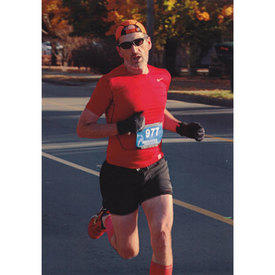Altitude

TheBrolympus
Posts: 586 Member
So in about a month I am going to be just south of Flagstaff, AZ for a week. I plan on trying to get several runs in during that week (one being a 10+ miler). I live at 700ft and the cabin I am staying at is at 7000ft. How much are my runs going to suck?
BTW: I am very excited about being able to run along pine trees and beautiful scenery in northern AZ.
BTW: I am very excited about being able to run along pine trees and beautiful scenery in northern AZ.
0
Replies
-
It'll be hard work regardless, but a couple suggestions to ease the pain:
1. Hydration - Higher altitudes tend to be drier and dehydration can sneak up on you, if you don't normally run with a water bottle, do so, and if you do, hydrate more.
2. Slow down - There's just less oxygen in the air for you to breathe, so your heart rate is going to be higher for a given pace, if you have an HRM try to stay in the zones you're usually in, regardless of pace.0 -
Thanks for the info.0
-
It'll be hard work regardless, but a couple suggestions to ease the pain:
1. Hydration - Higher altitudes tend to be drier and dehydration can sneak up on you, if you don't normally run with a water bottle, do so, and if you do, hydrate more.
2. Slow down - There's just less oxygen in the air for you to breathe, so your heart rate is going to be higher for a given pace, if you have an HRM try to stay in the zones you're usually in, regardless of pace.
Agree with that. Having a HRM is definitely a help in getting a number feedback for your overall effort.
Though if you've been putting in miles, have a decent base, and make sure to listen to your body, it won't have to suck THAT much, haha. I live at about 5300ft, and last summer did a few runs up at Big Lake, AZ (one of which was 11 miles), which was about 9500ft -- 1000ft. I did notice my heart rate was a bit higher than usual (nothing astronomical, just slightly higher than it would have been at home), so I didn't watch my pace and instead ran with what felt comfortable, and that helped make the runs much more enjoyable.0 -
Altitude affects different people in different ways. Whenever we visit friends in Colorado Springs my wife ends up deadly ill for 2 days before she adjust, I am able to go out and do stuff just not as fast as usual. Don't push yourself to hard.0
-
I always find it harder than I think it will be, so be mentally prepared for it to be hard. I would do your longest run on your last day when you are more acclimated.0
-
I find it harder to breath when running at higher elevation. Also, like what RunningActor said, it feels like you'll get dehydrated quickly at higher altitude.0
-
i spent the summer at about that elevation in Colorado last year. I agree, you'll need to slow down. In fact, if you have any speed work on your calendar I'd suggest just forgetting about it until you get back to a lower elevation. It's pretty much impossible to do speed work at elevation. But you should still see some improvement just from being exposed to the thin air.0
-
if you have any speed work on your calendar I'd suggest just forgetting about it until you get back to a lower elevation.
I hadn't planned on doing any speed work. My goal was to just get my miles in.
I also get to deal with some real hills. North Texas is pretty flat.
To get up to the road I want to do most my running on will force me to run the first .9 mile up a wicked hill (7.2% incline, http://www.strava.com/segments/4363121). I think once I am past that it will be easy sailing.
Thank y'all for the info. I am just going to take it slow and enjoy the scenery. Might take a camera to take some pictures (catch my breath).0
This discussion has been closed.





